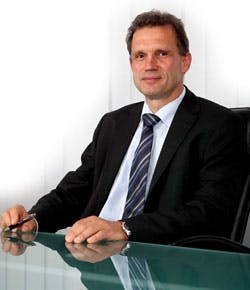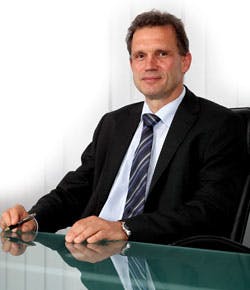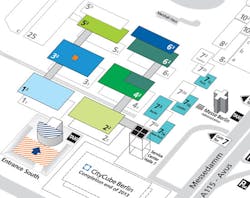Wasser, Wasser Überall
The bi-annual trade fair, congress and public show WASSER BERLIN INTERNATIONAL is returning on April 23 – 26 to bring the global water and wastewater sectors to Germany. WWi speaks to Dipl.-Ing. Jörn Winkels from the advisory council of the event to find out more about what can be expected from the growing show.
WWi: Why is Germany the ideal host for an international water summit and what lessons and experience can the German water sector pass on to international visitors?
Jörn Winkels, chairman of the advisory council of Wasser Berlin International and management member of Salzgitter Mannesmann Line Pipe GmbH (JW): Germany is a leading industrial nation with recognised high levels of engineering expertise. This also applies to the water industry's innovative developments and quality products. Extremely low losses in the water supply infrastructure and highly effective wastewater treatment are examples that underscore the capabilities of the German system. We also maintain high quality standards in respect of drinking water and industrial water.
Internationally speaking we rank at the top of the table. Following reunification and extensive structural changes in the Ruhr, German companies were able to gain experience from modernising old systems and land reclamation measures. That is an optimum basis for incorporating technology made in Germany into tailor-made solutions worldwide.
WWi: What is Messe Berlin undertaking at this year's Wasser Berlin to make it a more international show?
JW: As the name says, WASSER BERLIN INTERNATIONAL is already a trade fair with a strong international appeal. At the last event in 2011 one third of the exhibitors and trade visitors came from abroad. Every fair features an attractive partner region from abroad. This year the participation of our partner ACWUA (Arab Countries Water Utilities Association) underlines the international dimension of the fair. This association represents Arab water companies from 17 countries in the Middle East. Our cooperation includes an Arab Forum that focuses on the region's water industry and highlights possibilities for joint ventures. There will also be other international forums and delegations from numerous countries around the world. Not least, our media partner PennWell is a company of international repute. Thus there is a strong likelihood that this year's WASSER BERLIN INTERNATIONAL will be an internationally even more attractive event.
WWi: There has been a global increase in the number of water and wastewater trade fairs. What makes Wasser Berlin different from other events?
JW: WASSER BERLIN INTERNATIONAL is one of the very few trade fairs around the world with an exclusive focus on all aspects of water. This 360-degree approach mirrors the water industry's entire economic cycle. The focus is not on individual market segments but on a cross-sectoral approach and this is how we promote ourselves. Every visitor is treated as a potential business partner and will find the exact products and services he is looking for. Positioning the fair in this way has earned us a lot of praise and sets us apart from competitors.
WWi: What kind of innovations can we expect to see from exhibiting companies?
JW: WASSER BERLIN INTERNATIONAL has established itself as a platform where a lot of genuine innovations and world firsts can be seen. The ever shorter innovation cycles of manufacturers and service providers have accelerated this trend. As a result, WASSER BERLIN INTERNATIONAL should have a great deal to offer again this year. Detailed information can be found in the first part of our Innovation Report, which will be available online in early March at www.wasser-berlin.de. The joint stand of the Federal Ministry also guarantees that interesting new products will be on display. This is where new and innovative companies will be exhibiting their latest products. And lastly, Watervent will be participating in our fair in a bid to bring innovations and investors together.
WWi: Tell us about other events also taking place, such as No Dig Berlin?
JW: An extensive supporting programme will be accompanying the fair, providing additional benefits for visitors to the event. There is not enough time in this interview to list all the details of individual events. As an example of our wide-ranging programme I would like to highlight NO DIG BERLIN. It comprises a congress and exhibition and has information on trenchless construction methods which for over 30 years have represented an environmentally sound, low-cost alternative in underground pipeline construction. Another example is Schaustelle Wasser Berlin International, which showcases pipeline construction methods as well as ways to supply drinking water and treat wastewater. Visitors can find out directly how innovative construction methods are put into practice. I am confident that every visitor will find products and services that will significantly aid them in their day-to-day work.
WWi: Finally, if you summarise why people should visit Wasser Berlin International in five words, what would you say?
JW: Unique; informative; innovative; international and important.
SWAN Analytische Instrumente AG
SWAN is a leading manufacturer of on-line analytical instruments with headquarters in Switzerland. The applications range from ultrapure water, feedwater, steam and condensate monitoring as well as potable water and industrial water up to swimming pool and sanitary water applications. Parameters: Ammonium, Chlorine / Ozone / ClO2, Conductivity and Resistivity, Hydrazine / Carbohydrazide, Nitrate, Oxygen (dissolved), pH, Phosphate Redox (ORP), Silica, Sodium, Turbidity, Total Organic Carbon. Web: www.swan.ch Booth: Hall 6.2, Booth 122
Bürkert
When it comes to working with fluids, Bürkert is at your side - as a manufacturer of sophisticated products, as a problem-solver with an eye for the big picture, and as a partner offering you reliable advice. We are one of the few suppliers on the market to cover the complete control loop. Our current product range extends from solenoid valves through process and analytical valves to pneumatic actuators and sensors. Through Bürkert's customer-oriented application approach we have developed our knowledge and brought together an extended portfolio allowing us to offer our customers a comprehensive and attuned range of customized products and system solutions. Web: www.buerker.com Booth: Hall 6.2, Booth 212
SIPOS Aktorik
The specialist manufacturer of variable speed actuators will highlight the ability of its sophisticated actuation technology to address water hammer. Benefits of SIPOS' solution for surge include control of water flow to protect plants' systems. An extensive international installation base for SIPOS' electric actuators includes support for a high service water delivery pump station at the East Cherry Creek Valley Water and Sanitation district in Colorado. Water hammer capability was a key selection factor for SIPOS' products. Capability providing full support from pre-sale through to commissioning and on-site assistance will also be confirmed. Web: www.sipos.de Booth: Hall 4.2, Booth 422
Auma
AUMA presents its extensive range of modular electric actuation products supplied to the water industry. A central exhibit is the new SQ .2 part-turn range for butterfly and ball valve automation. Orders for SQ actuators for three-phase applications can be placed from February 2013 with delivery from April. SQ actuators for single-phase or Ex installations will be introduced in the second half of the year. Other key messages presented include long-standing expertise supporting potable / non-potable applications around the world, strength in service / technical support and actuation innovation. Web: www.auma.com Booth: Hall 4.2, Booth 304






